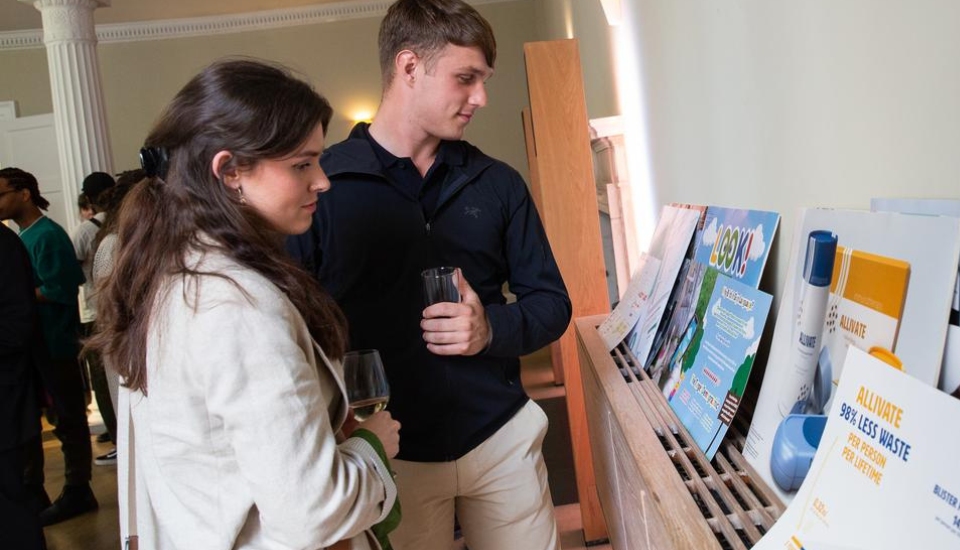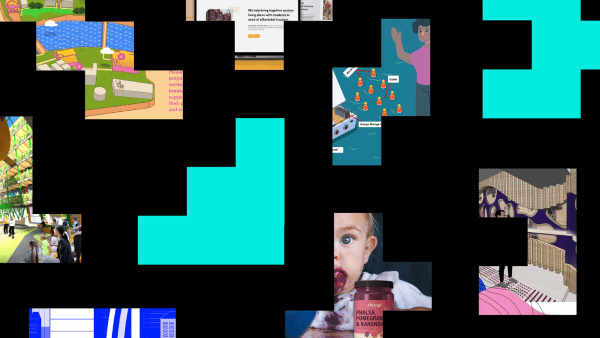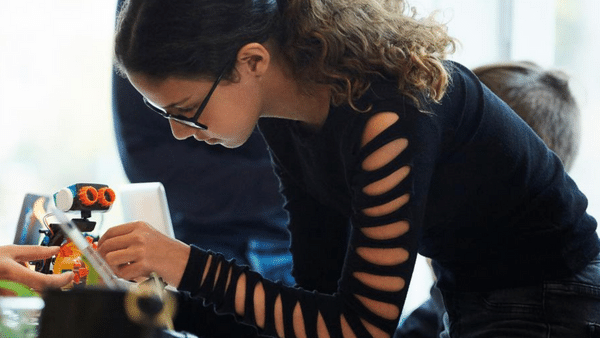How can we inspire innovation and recognise efforts to bring about social change? Anna Markland, Head of Innovation and Change, outlines how and why we’re bringing the Pupil Design Awards, Student Design Awards and our Catalyst funding under the new banner of Design for Life Awards.
Right from our inception, the RSA has put award-making and challenge prizes at the heart of catalysing positive change in society. As we approach the 100th year of our Student Design Awards, we have been asking ourselves: how might award-making be reimagined to create 21st century learning experiences that grow children’s, learners’, and entrepreneurs’ capabilities and ideas towards regenerative futures?
Collaborating with our external Test & Learn Group, a team of RSA staff has embarked on a journey to address this question head-on. Over the next year, we'll be eagerly shaping and unveiling our vision for the next 100 years of award-making, poised to drive greater impact than ever before. Welcome to The Design for Life Awards.
In this blog, we'll be sharing our emerging insights into future trends and the guiding principles that will shape our redesigned awards programme. For more information, visit the dedicated Design for Life Awards Circle space; our Circle online community platform.

Explore the Design for Life Awards
From 2024, our Design for Life Awards will offer collaborative and inclusive learning experiences for children, learners and entrepreneurs helping them grow the capabilities and ideas needed for a regenerative world.

Get involved with the Design for Life Awards
Join the Design for Life Awards space on our Circle community to share your feedback on our work, connect with like-minded Fellows about the work and ask questions, raise discussion points and share ideas relating to awards.
Embracing the future of learning, entrepreneurship and grant-making
As we contemplate the next century of award-making, we recognise the need to adapt to evolving trends in learning, entrepreneurship, philanthropy, and social investment. Some of the things we’ve been considering as we’ve been developing the Design for Life Awards are:
Technology and learning
The way we learn is on the cusp of a major transformation. Rapid advancements in artificial intelligence (AI), augmented reality, and digital content – while surfacing controversial debate – have already revolutionised educational access for both children and adults. This shift enables global learning beyond traditional academic settings and holds the potential for personalised, learner-led education that unleashes individual talents and capabilities.
Skills for life
The capabilities we require to navigate the next 100 years are rapidly changing. The World Economic Forum predicts a decade of interconnected environmental, societal, geopolitical, and economic challenges. In response, our ability to adapt, evolve, learn, unlearn, and re-learn becomes paramount. Lifelong learning must become the norm; research suggests that already 90 percent of today's UK workforce will require significantly different skill sets by 2030.
Furthermore, non-Western learning practices are gaining recognition, highlighting the impact of indigenous and traditional knowledge in addressing climate crises. With younger generations prioritising citizenship and stewardship (83 percent of Gen Z in the US say they now consider a company’s purpose when deciding where to work), there is a growing appetite for collaborative learning, fostering problem-solving skills and human uniqueness in the age of artificial intelligence.
Regenerative entrepreneurship
Businesses worldwide are redefining their purpose, setting ambitious targets for net zero, sustainability, and social impact. Simultaneously, the growing sector of social entrepreneurship attracts those who are underserved by the existing system. 47 percent of social businesses in the UK are led by women compared to 17 percent in other sectors. We must now contemplate the next evolution of B-Corps and ESGs, exploring possibilities such as recognising non-human stakeholders or future generations as company directors. Enterprise must respond to the rise of regenerative capitalism.
Philanthropy and social investment
Social finance is undergoing an evolution both in terms of accessibility and the range of financial tools available. Initiatives like the Big Issue Invest & UnLtd's Growth Impact Fund are disproving concerns of insufficient demand from underrepresented leaders, promoting racial justice and tackling inequality. Transparency and deep partnership are becoming key principles for funders, guided by the communities they serve, exemplified by practices like Shared Gifting Circles and Participatory Grantmaking.

Our guiding principles
As we refine the structure of the Design for Life Awards to maximise impact, we hold five core principles as our North Star for shaping ourvision and offerings.
1. Design for inclusion
From our existing work on rebalancing adult education and preventing school exclusions, as well as research from those in the social enterprise sector (such as the 2022 Adebowale Commission), we know the profile of children, learners and entrepreneurs who find it harder to access existing programmes. We want our new offer to actively reach these groups while continuing to meet the needs of our already engaged participants. Influenced by our work with Professor Chetty, we also see this as an opportunity to design for social mobility by intentionally nurturing new networks and connections.
What could this mean in practice?
- Move away from fixed entry points to a community so you can join whenever suits you.
- Work with new outreach partners – such as adult education colleges – to reach beyond our existing networks.
- Offer participation stipends.
- Create meaningful gatherings which bring together participants across geographic, socio-economic, and disciplinary backgrounds.
2. Grow regenerative capabilities
Leveraging our understanding of the skills required for regenerative futures, we aim to design and accredit experiences that help participants explore, develop, and apply these skills to the social impact work that resonates with them.
What could this mean in practice?
- Curate different learning journeys based on learner goals, catering to individuals at various stages, from introductory social impact work to scaling and movement building.
- Implement digital badging to accredit participation.
3. Start from place
We want to inspire ideas that put local context and potential at the centre of participant learning. Our awards should encourage collaboration with local communities, allowing them to test and implement social impact initiatives.
What could this mean in practice?
- Design flexible award programs adaptable to diverse participant environments.
- Leverage our global Fellows network to support participants.
- Integrate practices and rituals that connect with local people and places into the awards experience.
4. Harness the collective
Drawing inspiration from participatory budgeting, deliberative democracy, and peer-led learning, our awards will devolve power to Fellows, participants, and communities. Rather than focusing on competition and winners, we'll emphasise recognition of progress and participation.
What could this mean in practice?
- Establish an online space for participants to share ideas, receive feedback, and engage with peers and RSA Fellows.
- Organise regular "open mic" presentations to showcase the evolution of participants' practice.
- Involve participants in funding decisions, leveraging platforms such as Open Collective.
5. Steward mission-orientated partnerships
We know we are better able to deliver when we work with others in the ecosystem, understanding how we can complement and build on the successes and gaps that they have.
What could this mean in practice?
- Offer educators who are involved with promoting the awards a chance to build and get recognition for their capabilities and networks.
- Co-develop ‘evergreen’ challenge briefs that allow organisations to connect with generations of innovators.
What's next?
We're currently developing a comprehensive vision and detailed partner and participant experience maps for our new Design for Life Awards.
To ensure we deliver the impact we envision, we'll be testing elements of this vision throughout our upcoming rounds of the Pupil Design Awards, Student Design Awards, and Catalyst programs.
In 2024, we plan to launch a pilot year for the Design for Life Awards. If you're an RSA Fellow interested in shaping this vision with us, declare your interest in a comment on the Circle post about the Test & Learn group in the Design for Life Awards intervention space.
Read other Design for Life Awards content
-
Student Design Awards 2023: meet the shortlist
News
Aoife O'Doherty
The RSA Student Design Awards 2023 shortlist has been announced. Across nine briefs, 70 students are working to bring positive social change to people, place and planet.
-
Design mentors: supporting innovation in young designers
Blog
Milla Nakkeeran
As we conduct our mentor visits for the 2022-23 Pupil Design Awards read why the role of design mentors is so vital to young innovators.
-
RSA Catalyst Awards 2022: Round two winners announced
Blog
Beth D'Elia
Announcing the eight innovation projects receiving RSA Catalyst funding in round two of 2022's awards.




Be the first to write a comment
Comments
Please login to post a comment or reply
Don't have an account? Click here to register.